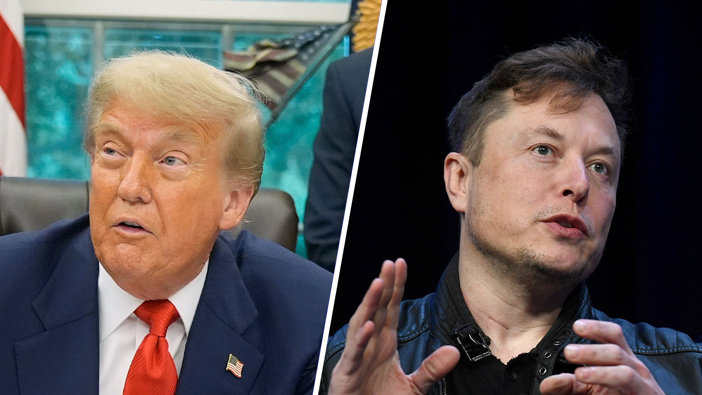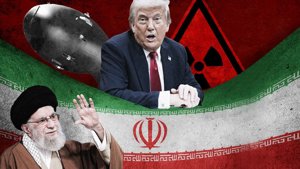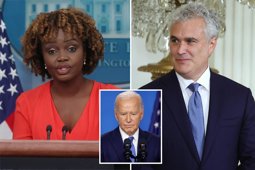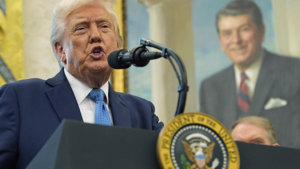
Trump Criticizes Musk’s America Party Move
President Trump dismisses Elon Musk’s ‘America Party’ launch, calling it disruptive and unlikely to succeed in U.S. politics.
Trump Calls Musk’s Third Party Effort ‘Ridiculous’
President Donald Trump sharply criticized Elon Musk’s announcement of a new third party, the ‘America Party,’ declaring that third-party efforts have “never worked” in the American political system. Speaking to reporters in Bedminster, New Jersey, before boarding Air Force 1, Trump responded directly to Musk’s move, which followed a viral online poll calling for political change. “I think it’s ridiculous to start a third party,” Trump stated. “We have a tremendous success with the Republican Party. The Democrats have lost their way, but it’s always been a two-party system, and I think starting a third party just adds to confusion.”
The president added that the American system was designed for two main parties and dismissed third-party ventures as historically futile. “Third parties have never worked. So, he can have fun with it, but I think it’s ridiculous,” Trump said, underscoring his belief in the two-party structure’s stability and effectiveness.
Musk’s ‘America Party’ and Growing Political Tensions
Elon Musk, billionaire entrepreneur and owner of X, announced the creation of the ‘America Party’ on his platform, citing public disillusionment with what he described as a corrupt and unrepresentative establishment. Musk’s decision followed a viral July 4 poll on X, where over 1.2 million participants, by a margin of more than two-to-one, supported the formation of a new party. “By a factor of 2 to 1, you want a new political party and you shall have it,” Musk wrote. He argued that the current system, dominated by Republicans and Democrats, functions as a “one-party system, not a democracy.” Musk stated his new party would “give you back your freedom.”
Musk’s campaign aims to contest a handful of congressional seats, forming a swing bloc intended to check what he perceives as the “worst excesses” of both major parties. He stopped short of referencing the president’s newly signed $3.3 trillion bill directly but has voiced increasing concern over government spending and policy direction, warning that continued unchecked fiscal measures threaten the nation’s economic future.
After his remarks to reporters, Trump continued his criticism on Truth Social, expressing disappointment in Musk’s recent actions and pointing to a deterioration in their relationship. The president alleged that third parties only serve to create “complete and total disruption and chaos,” saying, “we have enough of that with the Radical Left Democrats.”
Trump also linked Musk’s opposition to a recent legislative victory. The president touted his “Big, Beautiful Bill,” which eliminates the federal electric vehicle (EV) mandate, as a win for consumer choice. Trump claimed he had always been opposed to forced EV adoption, stating, “the new bill allows consumers to buy whatever type of vehicle they want, whether it is electric, gas, or hybrid-powered.” He noted that Musk, despite having endorsed Trump previously, did not object to this policy shift at the time. The president also revealed he had resisted Musk’s request to appoint a close friend to lead NASA, citing conflicts of interest and a commitment to protect the public.
Long Odds for Third Parties in U.S. Elections
The clash over the ‘America Party’ highlights long-standing challenges for third-party movements in the United States. The country’s election system, with its Electoral College, winner-take-all races, and complex ballot requirements, has historically favored the two major parties. Past third-party runs—including Ross Perot’s nearly 19% of the popular vote in 1992 and Teddy Roosevelt’s Bull Moose campaign in 1912—have rarely translated into lasting influence or electoral victory. Other figures, like Ralph Nader and Gary Johnson, also failed to break through the structural barriers to meaningful third-party success.
The emergence of the ‘America Party’ underscores ongoing dissatisfaction with mainstream politics, but as Trump reaffirmed, the obstacles to long-term viability remain steep. Both leaders now face intensifying scrutiny as the rift between them grows, reflecting deeper tensions within the American political landscape.






